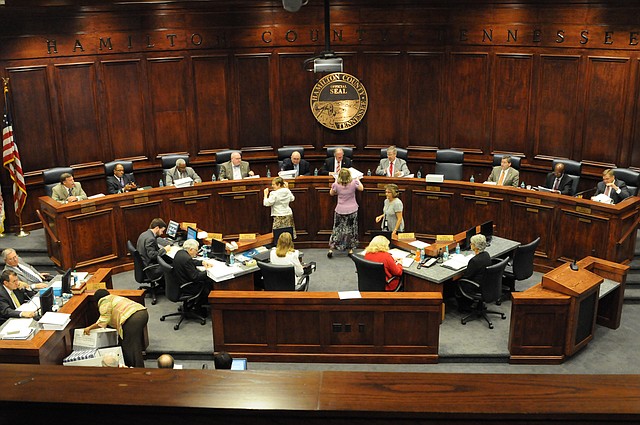Seniority costs Hamilton County millions of dollars
Saturday, August 10, 2013
BUILT-IN BENEFITSFiscal Year 2010Budgeted raises - $0Budgeted promotion -$372,817Longevity Pay -$644,550Total - $1,017,367•••Fiscal Year 2011Budgeted raises - $5,000Budgeted promotion -$288,744Longevity pay - $955,644Total - $1,249,388•••Fiscal Year 2012Budgeted raises - $0Budgeted promotion - $314,904Longevity pay - $681,450Total - $996,354Fiscal Year 2013Budgeted raises - $160,000Budgeted promotion -$303,452Longevity pay - $1,173,760Total - $1,637,212•••Fiscal Year 2014Budgeted raises - $187,631Budgeted promotion -$308,656Longevity pay - $1,191,600Total - $ $1,687,887•••From 2010 to 2014Budgeted raises - $352,631Budgeted promotions - $1,588,573Longevity pay - $4,647,004Total - $6,588,208Source: Hamilton County budgets
While Hamilton County government has been in a period of self-proclaimed belt tightening, department heads and constitutional officers have been given nearly $6.6 million over the past five years to funnel raises, promotions and other pay increases to employees.
A Chattanooga Times Free Press review found that nearly $1.9 million was budgeted for raises or promotions in various departments and constitutional offices, along with $4.6 million in longevity pay - a guaranteed structured pay increase based on length of service - from 2010 to 2014.
During that same period, county commissioners approved only one outright pay raise. Yet payroll costs mounted year after year.
County officials say budgeted raises and promotions aren't always paid out, and what money isn't used is returned to the general fund. But employees are always paid for longevity.
If distributed evenly - which it was not - the longevity pay was enough to give each of the roughly 1,800 county employees a $516 annual raise since 2010 - or $2,581 total each.
That's in addition to a 3 percent across-the-board raise commissioners handed out last budget year to county employees.
During the same period, private-sector businesses have moved away from automatic raises, cut pay increases altogether or gone to performance-based pay systems.
Hamilton County commissioners say they were aware that raises, promotions and longevity pay have been woven into
budgets throughout the years, but some expressed concern after hearing the figures.
Of the budgeted pay increases, longevity pay makes up the lion's share.
County Finance Administrator Louis Wright said Friday that county general government's program is for employees who stay on board for more than five years. Once employees reach their sixth year, they get $75 bumps on their paychecks every year -- including back pay for the first five years. The increases top out after 30 years. So a 15-year employee who makes $35,000 a year would actually be paid $36,125. Over that 15 years, the employee would have been paid $9,000 over base pay.
Constitutional officers can choose to set their own longevity pay systems, but not all do so.
County Commission Chairman Larry Henry said it might be time to look at longevity pay.
"In my business, I never did have longevity pay. Now, if I had employees who had been with me for 15 to 20 years ... I tried to compensate them when I could. But to have set longevity pay, I didn't have that," Henry said. "Sometimes I couldn't give a raise every year, or every three years or every five years."
Commissioner Tim Boyd said it's time to take a really, really hard look at all kinds of pay.
"That's how they get around letting the public know that people are getting raises, and then they come to us and say county employees haven't had a raise in years," Boyd said. He said $4.6 million "is a huge amount of money. And those are the kinds of budget numbers -- the way the mayor and his staff work the budget -- it's certainly not full disclosure."
But Mayor Jim Coppinger says longevity pay has been a county tradition "for many, many, many years." It's spelled out in the county employee handbook -- and, in fact, was increased in recent years, he said.
That being said, Coppinger said the policy -- and others -- still may deserve scrutiny.
"Just because policies have been around doesn't mean we don't need to take a look at them. I wouldn't want to single out just longevity, but it's something in the county handbook that we can review," Coppinger said.
Such practices are on their way out of the private sector, said Merri Mai Williamson, communications director for SHRM Chattanooga, a society of human resources professionals, with more than 200 members in Chattanooga.
Many companies in the region still pay based on longevity, but up-and-coming companies are paying performance-based raises, she said.
"A solid pay-for-performance system attracts applicants who are goal-driven and highly motivated; and these high-performing employees are more prone to remain loyal to the company," Williamson said in an email Friday.
Commissioner Fred Skillern, who is chairman of the commission's finance committee, said county pay scales need to be trimmed.
He's not in favor of taking benefits away from current employees, but he wants to bring future county jobs in line with similar jobs in the private sector.
"I'm open to suggestions to get things more fair ... what we need is equity in the pay -- public vs. private," Skillern said.
But Coppinger said longevity pay isn't too foreign to private-sector practices.
"It's called bonuses in the private sector, but obviously it's done objectively, not subjectively. It's across the board and everybody knows where it comes from," Coppinger said.
BUILT-IN RAISES
The budget for Hamilton County general government, constitutional officers and the sheriff's office this year is just less than $137 million. That includes nearly $1.7 million for budgeted raises and promotions, which Henry and others said has been "standard practice."
"There's always money set aside in departments for raises, if those raises are warranted for a calendar year," Henry said.
Even in June 2011, when the county laid off 37 workers to offset budget cuts, the spending blueprint for 2012 approved shortly thereafter included nearly $1 million for longevity pay and other raises.
Wright said raises and promotions in individual department budgets allow department heads to reward employees who get more education or assume new responsibilities.
"For a promotion, it means that an accountant is going from an accountant to a senior accountant. There's a position change, and not an in-line raise. And they are budgeted, but they are not always paid," Wright said.
Any unused money budgeted for raises or promotions is returned to the county's general fund. Wright could not immediately say Friday how much of the $1.9 million has been returned, saying it would take "in-depth analysis of the budget."
Skillern knows about budgeted raises, and he doesn't like them.
He says they widen the gap between the county's highest- and lowest-paid employees.
"One of the things I got very upset about with the budget was so many places where they put small amounts of money in there just so they could give a raise if they wanted," Skillern said. "As long as we have that kind of money laying around and [department heads and constitutional officers] have control of it, there will always be inequity."
On the other side, Commissioner Warren Mackey says raises for county employees are appropriate.
"First, there's cost of living. If [an employee] gets a degree, that is a justification for a raise. If that person takes on more responsibility, that is yet another justification to give a raise to that person," Mackey said.
In fact, Mackey said Friday he thought commissioners should receive a raise in pay. They are paid in the low to mid-$20,000 range for what is considered a part-time position.
"I think it's pretty amazing the county commissioners' pay, and how that's remained constant. Since I've been [in office], at least in the last six years, we have not raised our pay," Mackey said. "I'm of the mindset that given the numbers of hours we've worked and put in, ours is definitely not part-time work. It's full-time."
Contact staff writer Louie Brogdon at 423-757-6481 or lbrogdon@timesfreepress.com.

